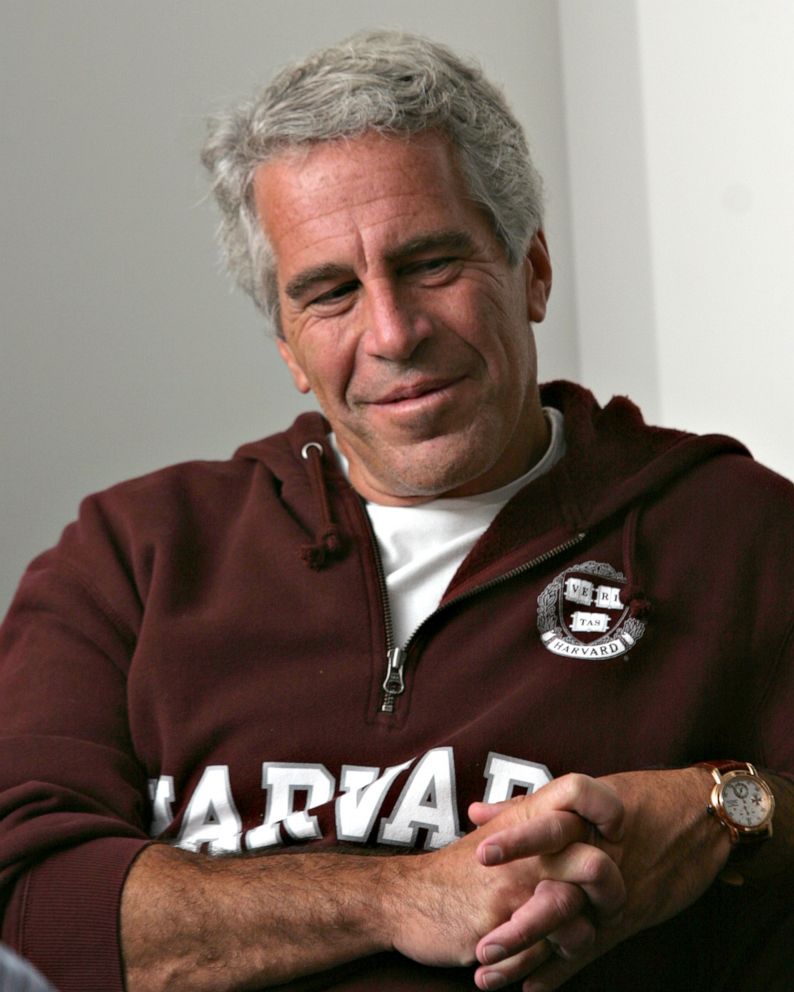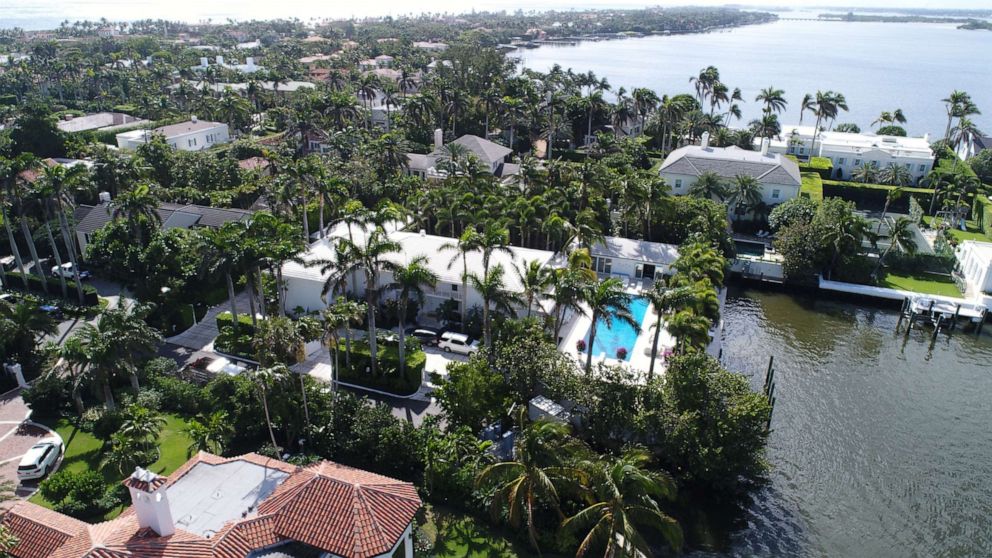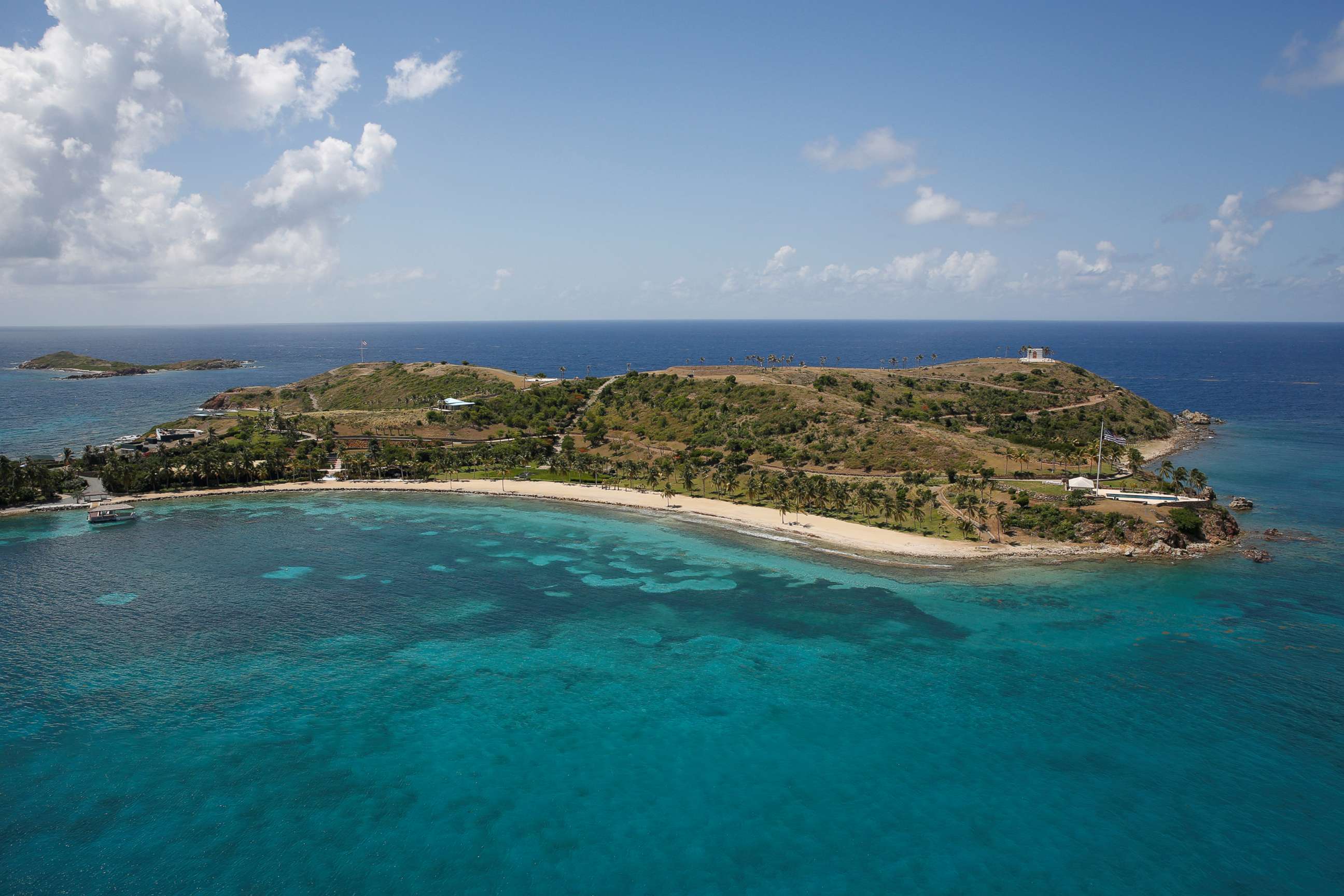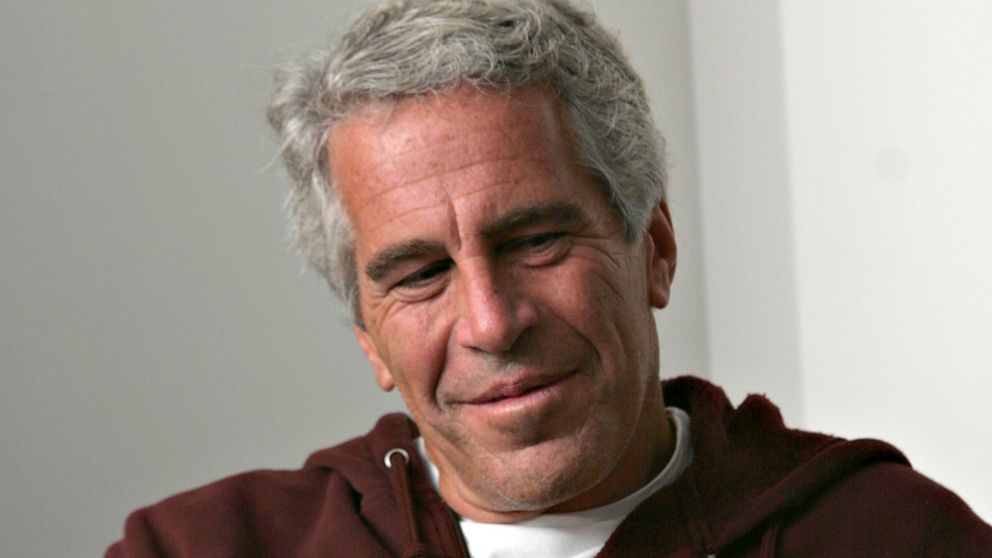In battle with Epstein estate, Virgin Islands takes aim at his lawyer, accountant
The government of the U.S. Virgin Islands on Wednesday sued the two men handpicked by Jeffrey Epstein as co-executors of his vast estate, alleging that the convicted sex offender’s longtime lawyer and accountant were “indispensable captains” of Epstein’s alleged criminal enterprise who “profited substantially” from their relationship with him, according to an amended civil lawsuit filed in St. Thomas.
Denise George, the attorney general of the island territory, contends in the new court filing that while Epstein was alive, the co-executors of his estate, Darren Indyke and Richard Kahn, made payments from Epstein’s personal, corporate and nonprofit accounts to alleged sex-trafficking victims -- including those who also acted as recruiters -- facilitated at least three sham marriages between alleged victims, and filed official financial statements for Epstein’s companies that they “knew or should have known” were false.
Indyke and Kahn “directed, approved, enabled, and justified millions of dollars in payments that fueled the Epstein Enterprise’s sex trafficking, including payments to women who were forced to have sex with Epstein and/or recruited others to be victimized,” according to the attorney general’s complaint. “[They] organized, controlled, and directed almost every aspect of the Epstein Enterprise. They were officers in virtually every corporate entity that Epstein created to fund and conceal his activities.”
“Indyke and Kahn were, in short, the indispensable captains of Epstein’s criminal enterprise, roles for which they were richly rewarded,” the complaint states.

The government’s new complaint adds Indyke and Kahn as individual defendants to an existing lawsuit George filed against the Epstein estate last year, which alleged that Epstein created of web of companies and individuals who conspired to enable, finance, and protect his alleged sex-trafficking of young women and girls to the Virgin Islands.
Neither Indyke nor Kahn has ever been accused of participating in any of Epstein’s allegedly illicit sexual activities, and the attorney general’s complaint does not allege any direct involvement by either man. Both are specifically excluded as individual defendants for eight of the 26 counts in the amended complaint, which allege acts against women and children.
Daniel Weiner, an attorney for the co-executors, told ABC News by email that Indyke and Kahn “categorically reject the allegations of misconduct made for the first time today by the Attorney General of the Virgin Islands regarding their purported roles in the so-called ‘Epstein Enterprise.'”
“Neither Mr. Indyke nor Mr. Kahn had any involvement in any misconduct by Mr. Epstein of any kind, at any time. It is enormously regrettable that the Attorney General chose to level false allegations and to unfairly malign the Co-Executors’ reputation without any proof or factual basis to do so,” Weiner wrote.
The attorney general makes new allegations in the amended lawsuit that after his 2008 guilty plea in Florida for soliciting prostitution from a minor, Epstein allegedly began to focus on procuring and abusing women from Eastern Europe, whose “immigration status and language barriers made them more isolated, dependent, and vulnerable to Epstein’s abuse and manipulation.”
In one example detailed in the complaint, Indyke, the attorney, allegedly made payments from one of Epstein’s personal accounts totaling more than $2.5 million “to dozens of women with Eastern European surnames, purportedly for hotel expenses, tuition, and rent, and to [an] immigration lawyer in New York who was involved in one or more forced marriages arranged among Epstein’s victims to secure victims’ immigration status.”
“Based on the Government’s current knowledge,” the complaint says, “Epstein, with Kahn and Indyke, held and managed at least 140 different bank accounts for Epstein and Epstein-owned entities, many of which existed only to transfer payments to other entities and accounts.”
In a statement late Wednesday announcing the new court action, George said Indyke and Kahn were added to the government's lawsuit as individual defendants “based on newly obtained information revealing their involvement as ‘captains’ of Epstein’s criminal enterprise.”
“This includes their direct participation in virtually all of the business operations and financial activities of Epstein’s trafficking network, including facilitating forced marriages among Epstein’s victims to secure their immigration status,” the statement said.
Indyke, 55, and Kahn, 48, had previously been named as defendants in the government’s lawsuit but only as it pertained to their official duties as the estate’s co-executors. Now they are also being sued individually, potentially exposing their personal assets to forfeiture if the government is able to prove its claims. The attorney general contends in the court filing that “the sheer complexity of the infrastructure” set up by Epstein, with the participation of Indyke and Kahn, suggests an “unlawful purpose” and that the two men “profited substantially from their relationship with Epstein.”
“The amount of their payments is further evidence of the illicit nature of the work they performed,” the complaint says. The precise figures the men allegedly received are redacted from the public version of the court filing.

The amended lawsuit also contains a new account of one alleged victim, who contends that she was flown from New York to Epstein’s Virgin Islands home dozens of times, starting in 2004 when she was 20 years old. She was allegedly “repeatedly abused by Epstein and was also pressed to have sex with Epstein’s business colleagues.” Years later, the lawsuit alleges, she was “forced into an arranged marriage to another victim” that was allegedly facilitated by Indyke to “prevent the other victim from being deported.”
Almost immediately after the wedding, the lawsuit alleges, Indyke worked with an immigration lawyer retained by Epstein to prepare the woman for communications with federal immigration authorities. Kahn allegedly provided a letter of reference for the immigration proceeding.
“When the victim [later] inquired about ending the marriage and leaving Epstein’s circle,” the government alleges Indyke “repeatedly tried to talk her out of a divorce and warned that she would lose Epstein and his associates’ protection” if she went through with it.
The government alleges Indyke and Kahn facilitated at least two additional arranged marriages between alleged victims from the U.S. and alleged foreign victims who Epstein sought to keep in the U.S.
“The victims were coerced into participating in these arranged marriages, and understood that there would be consequences, including serious reputational and bodily harm, if they refused to enter a marriage or attempted to end it,” the complaint alleges.
“In each instance, Indyke and Kahn knowingly facilitated the fraudulent and coerced marriages, performing and securing the legal and accounting work involved and enabling a fraud that would further bind Epstein’s victims to him and enable Epstein to continue to control and abuse these victims sexually,” the government alleged.
Those allegations track substantially with the claims in a civil lawsuit filed in 2019 by an anonymous accuser known in court records as Katlyn Doe. She alleged that Epstein sexually abused her for years and pressed her into marrying another woman, who was not a U.S. citizen, promising to pay Doe $20,000 so that she could afford surgery for a medical condition. Doe did not name Indyke in the lawsuit but alleged that Epstein’s “longtime attorney” prepared the legal paperwork for the ceremony, which included posing for photographs to “give the appearance that the marriage was legitimate.”
Epstein, a New York-born financier from middle-class roots, had mysteriously amassed a fortune which was estimated last year to be worth as much as $655 million. He owned high-end residential properties in New York, Paris, Florida, New Mexico and the Virgin Islands, and a private aircraft fleet that featured a Boeing 727, two Gulfstream jets and multiple helicopters. The estate’s value has since plummeted to about $240 million, after $190 million in federal estate tax payments, millions more in legal fees and $87 million dedicated to an independent restitution program to compensate alleged victims of Epstein’s sexual abuse, according to the latest accounting report by lawyers for the co-executors.
Epstein selected Indyke and Kahn, who over the years had served as officers of a myriad of vaguely connected Epstein companies, to oversee his estate in a will signed two days before his death, which was ruled a suicide by hanging, in a New York federal jail in August 2019. The sole beneficiary of the estate is an entity Epstein called “The 1953 Trust,” an apparent reference to the year of his birth. Indyke and Kahn, by the terms of the will, are each to be paid $250,000 annually to serve as the co-executors.
The addition of Indyke and Kahn as personal defendants in the civil lawsuit represents a significant escalation of the Virgin Islands government’s already wide-ranging investigation of Epstein’s personal and financial activities across the globe. The attorney general’s initial complaint, filed early last year, alleged that Epstein created a network of companies and individuals that participated in and conspired with him in a decades-long pattern of criminal activity tied to alleged sex trafficking of minor girls and young women. The government also contended that one of Epstein’s businesses, Southern Trust Company, misrepresented the nature of its work to fraudulently obtain more than $73 million in tax incentives. Indyke and Kahn were, respectively, the secretary and treasurer of Southern Trust.
Indyke has been associated with Epstein for at least 20 years, according to public records and legal filings. His name appears on paperwork as an officer for numerous Epstein-related charities, real estate holding companies and many of the shell companies that controlled most of Epstein's vast wealth and real estate holdings around the world.
Kahn began working for Epstein in 2005, according to an estate legal filing in an alleged Epstein victim’s civil case. Kahn’s name appears on a 2008 tax form in which he is identified as the treasurer of the C.O.U.Q Foundation, an Epstein nonprofit organization also known as the Florida Science Foundation. In the year prior, the treasurer’s post had been held by Ghislaine Maxwell, the former British socialite who now stands accused by federal authorities of facilitating Epstein’s abuse of three minor girls in the mid-1990s. Maxwell has pleaded not guilty. Indyke has done occasional work for Maxwell, including creating the company that purchased her former townhome in New York City.
When Epstein came under investigation in Florida for alleged sex crimes against dozens of minor girls, Indyke lent his voice in support of his employer's character. In a letter sent in 2008 by Epstein's criminal defense lawyers to prosecutors in Florida, in which Indyke is identified as "general counsel to Jeffrey," Indyke is quoted as crediting Epstein for providing emotional support and financial assistance when Indyke and his wife were struggling to start a family.
"Thankfully, after our fifth cycle, my wife and I were blessed with twin daughters," the letter quotes Indyke as saying. "Although Jeffrey was adamant that we owed him nothing, Jeffery honored us by agreeing to be the godfather of our children."
After Epstein worked out a plea deal to serve 13 months in a Palm Beach County jail, Indyke was among his first and most frequent visitors, according to logs kept by the county sheriff. He also vouched for Epstein’s employment at the Florida Science Foundation, which helped the convicted sex offender gain approval for a lenient work-release program that eventually allowed Epstein to leave the jail for up to 16 hours a day, seven days a week.

The Virgin Islands government’s lawsuit against the Epstein estate seeks the forfeiture of proceeds and property tied to the alleged criminal conspiracy, including “Little St. James” and “Great St. James,” Epstein’s two private islands off the east coast of St. Thomas, which were initially valued about $86 million, according to the estate’s initial accounting report. The attorney general has also filed criminal activity liens against all of the estate’s assets, giving her de facto oversight and control of the estate’s purse strings.
Lawyers for the estate have filed a motion to dismiss the government’s lawsuit, contending that the claims are untimely and legally unsound. The estate also claims that the attorney general’s liens have interfered with the estate’s ability to preserve its assets, hindered its efforts to sell Epstein’s properties and put at risk the potential recovery for alleged victims and other creditors.
“If the Attorney General actually had in mind the best interests of Mr. Epstein’s victims, she would grant the Co-Executors’ repeated requests that she immediately release her liens on the two Virgin Islands properties owned by the Estate and allow the Co-Executors to sell those properties to fund the Epstein Victims’ Compensation Program,” wrote Weiner, the attorney for the co-executors of the estate, in an email Wednesday. Estate lawyers claimed in a separate court filing Wednesday that the co-executors have received interest from potential buyers for Epstein's islands and "several bona fide offers to purchase them."
The estate has so far refused to engage in pre-trial document exchanges with the government while the motion to dismiss is still pending. But over the past year, the attorney general’s office has aggressively pursued its case, issuing more than 60 third-party subpoenas to financial institutions, art auction houses, modeling agencies and several individuals who associated and traveled with Epstein or conducted business with him. The information gleaned from those subpoenas, the government said, has resulted in the specific new allegations in the amended complaint, including those involving Indyke and Kahn.




